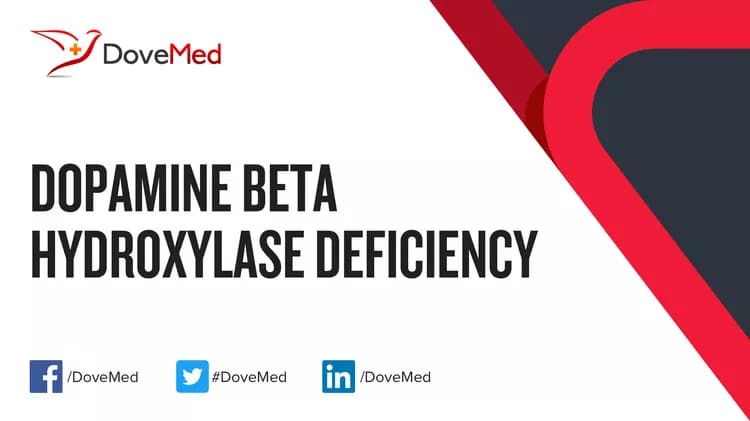What are the other Names for this Condition? (Also known as/Synonyms)
- Congenital Dopamine Beta-Hydroxylase Deficiency Disorder
- Noradrenaline Deficiency Disorder
- Norepinephrine Deficiency Disorder
What is Dopamine Beta-Hydroxylase Deficiency Disorder? (Definition/Background Information)
- Dopamine Beta-Hydroxylase Deficiency Disorderis a disease which affects the body’s ability to regulate blood pressure and body temperature
- Symptoms typically begin in late childhood and include vomiting, dehydration, low blood pressure, especially upon standing (orthostatic hypotension), andlow blood sugarlevels (hypoglycemia)
- Low blood pressure can also cause dizziness, blurred vision, and difficulty exercising. Some people have experienced drooping eyelids (ptosis), muscle pain, and weakness
- Dopamine Beta-Hydroxylase Deficiency Disorder is caused bymutationin theDBH geneand isinheritedin anautosomal recessivemanner
- Diagnosis is based on blood tests showing high dopamine levels and low norepinephrine levels. Treatment with a synthetic form of norepinephrine can reduce hypotension
(Source: Dopamine Beta-Hydroxylase Deficiency; Genetic and Rare Diseases Information Center (GARD) of National Center for Advancing Translational Sciences (NCATS), USA.)
Who gets Dopamine Beta-Hydroxylase Deficiency Disorder? (Age and Sex Distribution)
- Dopamine Beta-Hydroxylase Deficiency Disorder is a rare congenital disorder. The presentation of symptoms typically begins in late childhood
- Both males and females may be affected
- Worldwide, individuals of all racial and ethnic groups may be affected
What are the Risk Factors for Dopamine Beta-Hydroxylase Deficiency Disorder? (Predisposing Factors)
- A positive family history may be an important risk factor, since Dopamine Beta-Hydroxylase Deficiency Disorder can be inherited
It is important to note that having a risk factor does not mean that one will get the condition. A risk factor increases one’s chances of getting a condition compared to an individual without the risk factors. Some risk factors are more important than others.
Also, not having a risk factor does not mean that an individual will not get the condition. It is always important to discuss the effect of risk factors with your healthcare provider.
What are the Causes of Dopamine Beta-Hydroxylase Deficiency Disorder? (Etiology)
- Dopamine Beta-Hydroxylase Deficiency Disorder is caused bymutationin theDBH geneand isinheritedin anautosomal recessivemanner
(Source: Dopamine Beta-Hydroxylase Deficiency; Genetic and Rare Diseases Information Center (GARD) of National Center for Advancing Translational Sciences (NCATS), USA.)
Autosomal recessive: Autosomal recessive conditions are traits or disorders that occur when two copies of an abnormal gene have been inherited on a non-sex chromosome. If both parents have an autosomal recessive condition, there is a 100% likelihood of passing on the mutated genes to their children. If, however, only one mutant copy of the gene is inherited, the individual will be a carrier of the condition, but will not be present with any symptoms. Children born to two carriers, have a 25% chance of being homozygous dominant (unaffected), a 50% chance of being heterozygous (carrier), and a 25% chance of being homozygous recessive (affected).
What are the Signs and Symptoms of Dopamine Beta-Hydroxylase Deficiency Disorder?
The signs and symptoms of Dopamine Beta-Hydroxylase Deficiency Disorder vary, but may include:
- Vomiting
- Dehydration
- Low blood pressure, which can cause
- Dizziness
- Blurred vision
- Difficulty exercising
- Orthostatic hypotension (low blood pressure upon standing from a seated position)
- Low blood sugar (hypoglycemia)
- Droopy eyelids (ptosis)
- Weakness
- Muscle pain
In addition to the above signs and symptoms, a high palate, nocturia (excess urination in the night time), retrograde ejaculation (ejaculation in the bladder) and seizures may also occur. Rarely, newborns exhibit signs and symptoms of hypoglycemia (neonatal hypoglycemia).
(Source: Dopamine Beta-Hydroxylase Deficiency; Genetic and Rare Diseases Information Center (GARD) of National Center for Advancing Translational Sciences (NCATS), USA.)
How is Dopamine Beta-Hydroxylase Deficiency Disorder Diagnosed?
- Dopamine Beta-Hydroxylase Deficiency Disorderis diagnosed based on blood tests showing high dopamine levels and low norepinephrine levels
(Source: Dopamine Beta-Hydroxylase Deficiency; Genetic and Rare Diseases Information Center (GARD) of National Center for Advancing Translational Sciences (NCATS), USA.)
Many clinical conditions may have similar signs and symptoms. Your healthcare provider may perform additional tests to rule out other clinical conditions to arrive at a definitive diagnosis.
What are the possible Complications of Dopamine Beta-Hydroxylase Deficiency Disorder?
The complications of Dopamine Beta-Hydroxylase Deficiency Disordermay include:
- Risk of falls and fall injuries due to dizziness and seizures
- Loss of consciousness due to hypoglycemia
Complications may occur with or without treatment, and in some cases, due to treatment also.
How is Dopamine Beta-Hydroxylase Deficiency Disorder Treated?
- Treatment with a synthetic form of norepinephrine can reduce hypotension in individuals suffering from Dopamine Beta-Hydroxylase Deficiency Disorder
(Source: Dopamine Beta-Hydroxylase Deficiency; Genetic and Rare Diseases Information Center (GARD) of National Center for Advancing Translational Sciences (NCATS), USA.)
How can Dopamine Beta-Hydroxylase Deficiency Disorder be Prevented?
Presently, Dopamine Beta-Hydroxylase Deficiency Disorder may not be preventable, since it is a genetic disorder.
- Genetic testing of the expecting parents (and related family members) and prenatal diagnosis (molecular testing of the fetus during pregnancy) may help in understanding the risks better during pregnancy
- If there is a family history of the condition, then genetic counseling will help assess risks, before planning for a child
- Active research is currently being performed to explore the possibilities for treatment and prevention of inherited and acquired genetic disorders
Regular medical screening at periodic intervals with tests and physical examinations are recommended.
What is the Prognosis of Dopamine Beta-Hydroxylase Deficiency Disorder? (Outcomes/Resolutions)
- The prognosis of Dopamine Beta-Hydroxylase Deficiency Disorder is dependent upon the severity of the signs and symptoms and associated complications, if any
- Individuals with mild conditions have better prognosis than those with severe symptoms and complications
- Typically, the prognosis may be assessed on a case-by-case basis
Additional and Relevant Useful Information for Dopamine Beta-Hydroxylase Deficiency Disorder:
The following DoveMed website link is a useful resource for additional information:
Related Articles
Test Your Knowledge
Asked by users
Related Centers
Related Specialties
Related Physicians
Related Procedures
Related Resources
Join DoveHubs
and connect with fellow professionals


0 Comments
Please log in to post a comment.